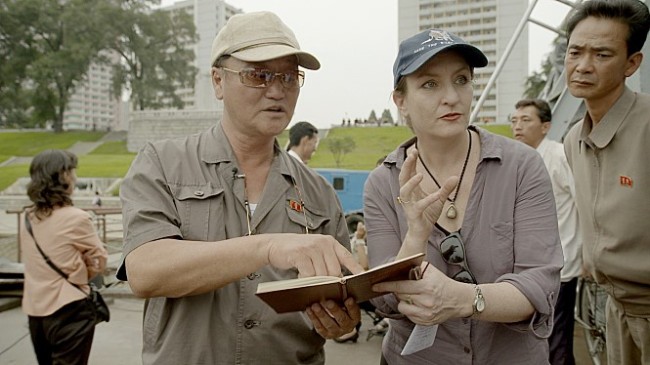Before its recent pursuit of diplomacy, North Korea had appeared hostile to other countries, from its sworn enemy of “capitalist Americans” to its southern neighbor.
“Whenever a film is made about North Korea, three stories are allowed: It (North Korea) is a land of gulags and starvation, it is an evil brainwashing empire where the citizens have no control, or it is a backward state and a member of the axis of evil,” said Anna Broinowski, the documentary filmmaker who directed “Aim High in Creation!.”
The documentary, created with cooperation from Pyongyang officials, attempts to highlight the human side of the communist state.
 |
(DocForest) |
“My job is to find human stories, complexities and nuances in the world that I’m filming,” she said. “It was to humanize the North Korean filmmakers, who, through no fault of their own, are born there.”
The film revolves around Broinowski’s real-life efforts to shoot a short film opposing a coal seam gas mine being built near her Sydney home. Believing that the “propaganda” of large energy corporations blocks the public from seeing the environmental effects of the CSG, Broinowski decided to take lessons in filmmaking from the masters of propaganda cinema.
Broinowski and her cast -- under the mentorship of North Korean filmmakers -- learn how to produce a North Korean-style melodrama that rises up to defeat the “evil capitalists” of the gas companies.
What stands out about the documentary is the genuine bond that forms between North Koreans and Broinowski. It is clear that despite being from the North, the North Korean filmmakers show trust and respect to their Australian counterparts.
“I didn’t want to make a film about an evil regime, although I didn’t want to deny that it is evil,” Broinowski said.
The film is clear on the fact that North Korea is ruled by a dictator, and its repressive nature is implied through the people’s reluctance to say anything against “The Dear Leader,” whom at this point is Kim Jong-un.
But Broinowski said she wanted to use the opportunity to build a cultural bridge between the reclusive state and the rest of the world.
“Our similarities as filmmakers are greater than our differences. ... Because I believe that the best solution (for conflict with North Korea) is -- for me -- peace, not war,” she said.
As a film, it is surprisingly quite funny. The North’s eccentric ways of filming -- over-the-top speeches, sporadic bursts into musical numbers and overdramatization of the showdown against “the evil capitalists” -- and how they are applied in Broinowski’s “The Gardner” are genuinely hilarious, as is the casts’ effort to learn them.
The film captures the heart of filmmakers in North Korea, focusing on the human side that has often been overlooked by outsiders.
As a documentary film, the tonal shift and divided focus between the two themes -- humanizing Pyongyang’s filmmakers and raising awareness on the environmentally adverse effects of the CSG -- are jarring.
The aforementioned black comedy aspect is a double-edged sword because it feels like a satire and ridicule of the North Korean filmmaking industry, regardless of the original intent.
An interaction between the local farmers directly affected by the CSG and the cast members strongly drives home the environmental message, but the sudden tonal shift feels like the sequence has been shoehorned, which is obviously not the case. The sequence itself is powerful enough, but the shift is so sudden that it almost seems out of place.
While both themes are poignant, it is hard to say that they were seamlessly connected.
By Yoon Min-sik
(
minsikyoon@heraldcorp.com)








